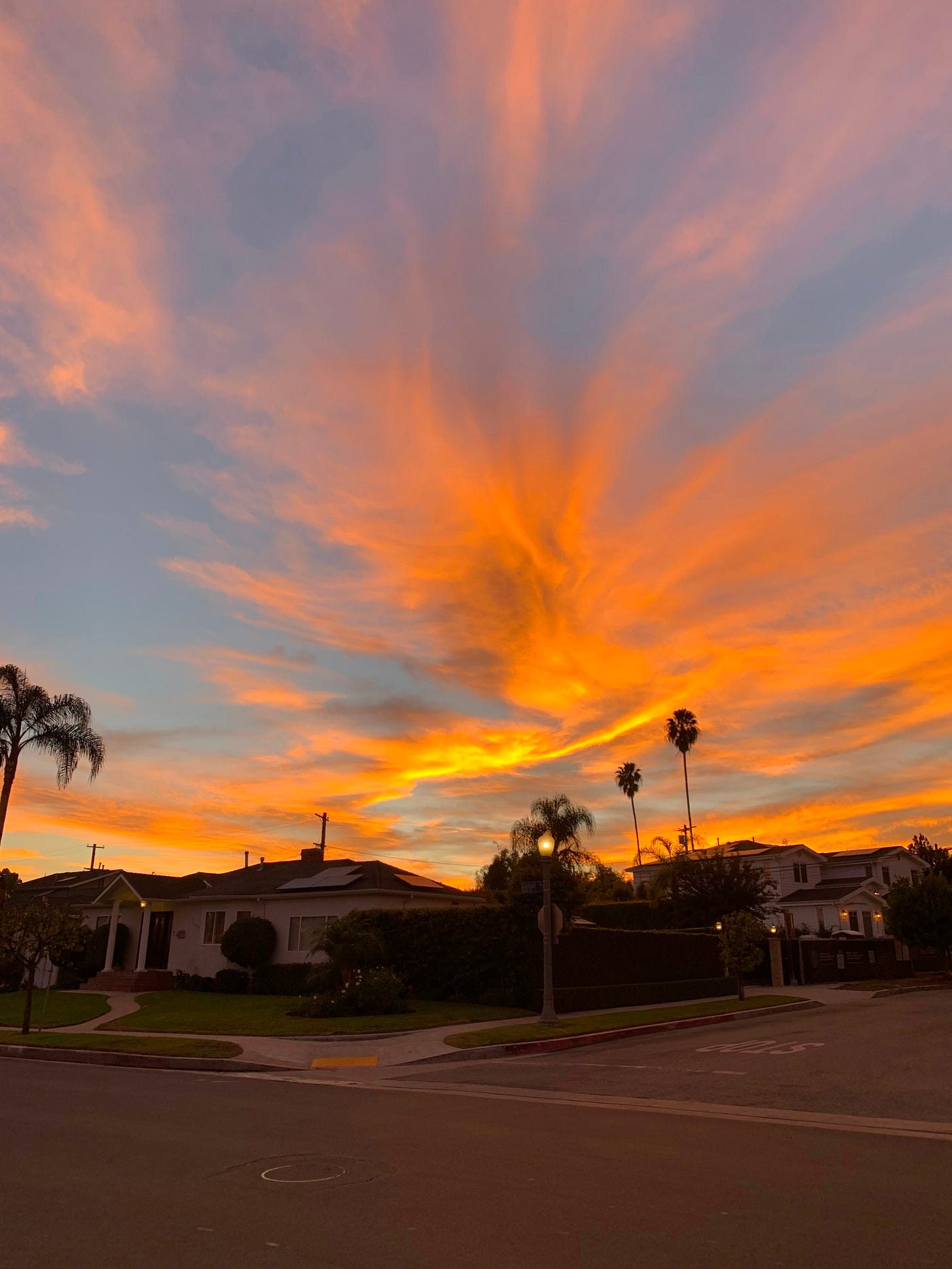Running towards the fire
"The city burning is Los Angeles's deepest image of itself."
On November 8, 2018, I sat at a Starbucks at the corner of Sepulveda and Washington in Culver City California. I used to walk here before work to write, pecking away at screenplays I’d never make. I had been in Los Angeles for only three months at this point. An ambitious 24-year-old underneath an endless sky. As I walked out the door and looked north I could see the Woolsey fire burning the hills of Malibu. Back home in Michigan, snow fell for the first time that year. Life has always been this way, Rome burns while others fiddle.
Los Angeles is a confounding place for an outsider. I don’t remember seeing a cloud during my first year, and it felt disorienting, as if time wasn’t passing. The sun sets early in the winter, but when it does, nothing is more beautiful than the California sky. During the golden hour, it’s God’s most obvious country.
You can’t understand a city of contradictions without spending time there. It’s a loose confederacy of neighborhoods and towns separated by concrete but bound under that endless sky. Many have revisited Joan Didion’s essay on the Santa Ana winds and their mighty power this week. It was only last year I first read that essay, but it didn’t feel like I was discovering something new in its words. Instead, something that was already inside of me was awakened. Because to live in Los Angeles is to know the fury, might, and unease that hot air can bring. It was that first fall, around the time I was writing screenplays in Starbucks, that an Angeleno told me fall meant it would be windy. In a place without seasons, this makes do.
I’m safe 2000 miles from the inferno, but the people and the city where I spent so many years are not. In a city where I danced and ate, drank and smoked, loved and cried, the air now chokes the lungs of children. Families uprooted from their homes. The fire is a kind of violence and its aftermath and recovery will be violent for those left without homes, food, and clothes.
I don’t know how tragedies played out before the internet or 24-hour news. I only can speak to this life. But it’s strange to watch a place I know be turned into content by the worst people in public life. Los Angeles is a place that defies labels and categories. Seeing our government talk about conditioning aid to people during the worst moments of their lives seems cruel for the sake of cruelty. People's homes aren’t talking points and lives lost to climate change aren’t engagement.
If you've never been, it’s cheap to joke about Los Angeles traffic. It’s easy to paint it as a green juice-drinking woke-oasis. But the roads are gridlocked because it’s a city of blue-collar hustlers always grinding out the next job. Laborers, union hands, and delivery drivers make ends meet on canals of asphalt. Their chariots; sedans and SUVs, were abandoned as the flames enclosed. The automobile was the American dream, and Los Angeles is that dream come alive.
I think a lot about leaving Los Angeles. For the last 18 months, I’ve felt like I was running away. I’m not on the lam, but I was lost. But sometimes tragedy shakes the sleeping self. It's easy this week to focus on the worst actors profiting off the pain of others. But through smoke, there is a way forward. At least eight states have sent firefighters to assist, and so have two other countries. These heroes ran into the flames to save lives. Journalists ran in to tell the stories others couldn’t. The greatest chefs in the greatest food city on earth opened their kitchens to feed the hungry and the heroes. The incarcerated jump into action for only $10 a day to keep people safe in a country that will turn its back on them when the fires go out. In these darkest times, grace often shines the brightest. The winds have slowed for now, but the worst is far from over. In a city still recovering from a pandemic, labor strikes, and an affordability crisis, this is a setback that would doom most places. But Los Angeles is not like most places.
I’m not writing this for those still in Los Angeles, but for the rest of us who are not there. The next fire might not be a fire, but there will be a next fire. For a lot of people, the next four years will be a fire. We can shut down at the idea and allow all the worst people to be the loudest in the room. Or, we can look to the people running into the flames as guides. Words are cheap, but doing is hard. People inside the fire already know.
See you next week.


